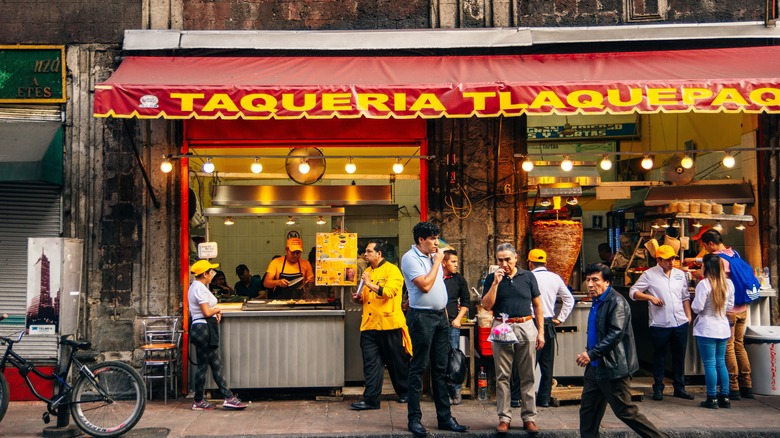The Best Thing To Do If You Get Sick While On Vacation In Mexico
Guacamole-coli. Salsa-monella. Montezuma's Revenge. Whatever you call it, a case of diarrhea can ruin your bachelorette party in Oaxaca or sour your honeymoon in Mazatlan. But cutesy names aside, some cases can land you in the hospital with an IV drip for rehydration. According to the Centers for Disease Control, 80-90% of cases of traveler's diarrhea are caused by bacterial infections. E. coli, salmonella, and shigella are the most common in Mexico, but viral infections like norovirus and parasites like cholera and giardia can also occur. Evidence also suggests that while taking precautions is essential (get that cholera vaccine), you can still get sick from improper food handling behind the scenes, even in the safest destinations in Mexico.
What should you do if you catch a bug? You're not going to like it, but the answer is nothing, other than drinking lots of liquids and electrolytes (broth is a good source) to keep hydrated. Beyond that, it's a game of wait-and-see. Counterintuitively, you should not take anti-diarrheal medicines like Lotrimin or Immodium.
Your body is erupting like Popocatépetl to rid itself of the infection, so you don't want to do anything to slow that process. If the acute phase of your illness lasts longer than a couple of days — most do not — you should see a doctor. However, the scary rise of antibiotic-resistant bugs has doctors hitting the pause button on overprescribing, so you may have to tough it out for a while first to see if things clear up naturally.
When to seek medical attention
A few symptoms indicate that you should see a doctor immediately, either while in Mexico or after you've returned home. These include blood in your stool, a fever over 102 degrees, or compulsive vomiting for hours, such that you can't keep fluids of any kind down, risking dehydration. In Mexico, many pharmacies have doctors on staff. If you're staying at a resort, there is likely a doctor on call who can administer IV fluids or medications if needed — probably not what you had in mind for an "all-inclusive" resort, but great when you need it.
If your symptoms develop 1-2 weeks after returning home, you might have contracted a protozoa like Giardia, requiring a doctor's visit and possibly antibiotics. Are you an adventure traveler with a penchant for muddy, wet excursions? That fever, headache, and nausea might be Leptospirosis, a sometimes fatal bacterial infection commonly transmitted by stormwater runoff or mud containing animal urine coming in contact with a cut or abrasion — the reason it's most often contracted by adventurers and post-storm aid workers. If you suspect exposure, a wait-and-see approach doesn't apply, so seek treatment ASAP. But while a rip tide might get you on the beach in Cabo, Leptospirosis won't because it's only found in freshwater.
This may seem like an extraordinary measure, but if you're utterly incapacitated, the US Embassy or Consulate can step in and help you get medical attention. This might be a good option if you're alone and can't get off the bathroom floor at your Airbnb.
An ounce of prevention goes a long way
Only drink bottled water with a seal you've broken yourself, and use this water to brush your teeth. Some unscrupulous street vendors may refill water bottles with tap water and glue the cap so it appears sealed. The clever work around if you're not sure of your bottled beverage's provenance? The CDC recommends carbonated beverages. If you will be out and about places where sealed beverages are scarce, carry a personal filter like a Lifestraw, which you can sip through. If you are really stuck, drinking hot beverages is much safer, so order a tea or coffee. Better yet, plan a visit to Ensenada's wine country and drink a bottle of vino or two, as the alcohol prevents bacteria formation.
Avoid salad, or anything uncooked, even at an all-inclusive resort. While you're avoiding raw veggies in Mexico, do the same with rare beef. The CDC has issued a Level I Travel Advisory (exercise precaution) about multidrug-resistant Salmonella Newport in Mexico, a bacterial infection primarily transmitted by eating undercooked beef (outbreaks of this troublesome disease have occurred in the U.S.).
Before you go for that delectable street taco, watch for telltale red flags indicating possible contamination like the same person handling money and food at a food stall. Another preventive step? Pack a bottle of good old-fashioned Pepto Bismol. Swigging it before a meal is shown to reduce the incidence of traveler's diarrhea by 50%.


